Any of these books can be ordered by clicking on our “order here” link below which will take you to our secure order form page at the Hearts & Minds website. Just tell us what you want, and we’ll deduct the 20% discount, confirm everything back to you, and then send your credit card receipt along with the package. Or, we’ll handle it any way you ask.
We usually send small order via “Media Mail” which is a bit slower but cheaper.USPS Priority Mail is as quick or quicker than UPS and cheaper.
Let us know how we can help.
Next week I’ll do a similar list of recent novels,
ideal for enjoyable summer fiction reading.
THE VALUE OF MEMOIRS AND SUMMER READING
Summer is a time when many spend some extra times reading stories. Novels, short stories, poems, even. And memoirs – we love memoir, including many of the must-read great ones, like Mary Karr’s spectacular Liars Club, Cherry, and Lit, or Augusten Burroughs Running With Scissors or Sara Mile’s eloquent, surprising, coming to faith narrative Taste This Bread: A Radical Conversion or Ta-Nehisi Coates’s first book (about growing up in Baltimore), The Beautiful Struggle. Hard stuff sometimes yield unforgettable stories like Jeanette Walls classic The Glass Castle or Frank McCourt’s best-selling Angela’s Ashes.
We have had Lauren Winner in our store reading from Girls Meets God and we someday would so love to meet Ian Cron whose Jesus, My Father, the CIA and Me: A Memoir, of Sorts is so very enjoyable, moving and memorable. Outdoorsy types love the fabulously written Wild by Cheryl Strayed while edgy bohemian types genuflect over Traveling Mercies by the trippy, remarkable Anne Lamott. (And for those who want a writer even a bit more flamboyant, I loved Lily Burana’s faith story called Grace for Amateurs. Beth enjoyed Pattie Smith’s Just Kids and I was blown away by Roxane Gay’s Hunger. A year or so ago we were celebrating H is for Hawk (by Helen Macdonald) and earlier this year the former first lady, Michele Obama, gave us all a beautiful glimpse into her life – including personal matters such as her miscarriages – in a well written book called Becoming.
I have reviewed before how moved I was by Given Up for You: A Memoir of Love, Belonging, and Belief by Erin O. White, an eloquent and exceptionally touching story of a lesbian Catholic convert who felt she had to choose between a life-long marriage to her partner or her faith and life in the church. I like reading memoirs of those who struggle with the church and I like reading stories of people’s marriages, so it was a wonderful read for me. I think the late Rachel Held Evan’s Searching for Sunday is her best. I think Eat Pray Love, despite its wacky spirituality, is better than the movie. We are glad Educated won the Pulitzer and is one we’ve carried since it first released. One of the most popular books we’ve sold on race and racism this year is the remarkable memoir I’m Still Here by Austin Channing. I suppose not everybody cares about a Calvin College bred Christian philosopher Nicholas Wolterstorff (he of many scholarly books, studies of aesthetics and justice) but his In This World of Wonder: A Memoir of a Life in Learning was a treasured read for me. We wish more would read C.S. Lewis’s wise memoir of coming to faith, Surprised By Joy or the poignant story of loss, A Grief Observed, written by Sheldon Vanauken, who narrative of loss includes correspondence with Lewis himself.
On and on we could go, naming books that have helped us understand how people make sense of their lives. For those who are Christians, especially those who care about outreach and evangelism, appreciating the worldview and texture of the lives of our fellows, all made in Gods image, all with some particular way they tell their story, is crucial. Not only is buying and reading memoirs an enjoyable entertainment option – some of these stories rival the best novels in artful plot and character development – it is training in understanding the human condition. If I were teaching an evangelism class, besides doing some basic gospel review and some Biblical guidance, I’d invite folks to read a memoir or two written by people very unlike yourself. Unless you hang around with tons of colorful, diverse characters and are a really good listeners, this method of immersing yourself in another’s story can’t be beat.
So, here are a small handful of a few we’ve enjoyed in recent months. I’m not kidding, you should pick up one or two of these and ponder how these people-cum-writers tell their life story. We show the regular retail price but will deduct our 20% OFF for BookNotes readers.
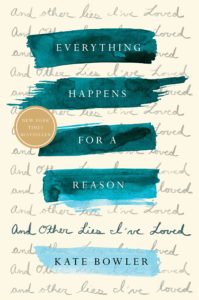 Everything Happens for a Reason And Other Lies I’ve Loved Kate Bowler (Random House) $16.00 paperback/$26.00 hardcover I know this isn’t brand new and I have to admit neither Beth nor I had read it when it was at the height of its buzz a year ago. We knew Bowler’s impressive and charitable ethnographic study of Pentecostal and prosperity preachers (Blessed, published by Oxford University Press) and knew that, in the midst of becoming a scholar of religion and teacher at Duke Divinity School, she was diagnosed with an awful, quickly developing, terminal brain tumor. We put the book under death and dying in our store, recommended it to those experiencing illness and, more, loss. I suppose that works, but now I also want to shelve it in our ordinary memoir section; this really isn’t a systematic critique of cheesy things people say or simplistic theology or even a theodicy, as such. It is her story. It is a memoir. And I Couldn’t. Put. It. Down. I’m not kidding – I laughed and cried and read some of the good parts out loud and told everybody I knew that week that they had to read this right away. My goodness, what a read, what a storyteller, what an experience she has had.
Everything Happens for a Reason And Other Lies I’ve Loved Kate Bowler (Random House) $16.00 paperback/$26.00 hardcover I know this isn’t brand new and I have to admit neither Beth nor I had read it when it was at the height of its buzz a year ago. We knew Bowler’s impressive and charitable ethnographic study of Pentecostal and prosperity preachers (Blessed, published by Oxford University Press) and knew that, in the midst of becoming a scholar of religion and teacher at Duke Divinity School, she was diagnosed with an awful, quickly developing, terminal brain tumor. We put the book under death and dying in our store, recommended it to those experiencing illness and, more, loss. I suppose that works, but now I also want to shelve it in our ordinary memoir section; this really isn’t a systematic critique of cheesy things people say or simplistic theology or even a theodicy, as such. It is her story. It is a memoir. And I Couldn’t. Put. It. Down. I’m not kidding – I laughed and cried and read some of the good parts out loud and told everybody I knew that week that they had to read this right away. My goodness, what a read, what a storyteller, what an experience she has had.
Yes, it is a bit unusual – not everybody has Duke Divinity School professors as colleagues, prayer partners, and extended family. (And not everybody thanking such important academics would call them “you Methodist sweethearts.”) When she thanks the likes of Lauren Winner and Will Willimon you know she has some serious writing support, along with solid spiritual aid. And not everybody has as devoted friends – and ones as funny and adventurous — as Kate has. I loved her pals and girlfriends (and husband, a true gem in the story, too.) And not everybody is on a first name basis with faith healers, from black store front preachers to mega-church celebrities, even if she doesn’t quite believe their prosperity or positive confession shtick. Although it is Bowler’s (painful) story, as with most stories, it is laced with colorful characters and good folk (and a few bone-headed ones.) She is blessed to have such a troupe of players in her life’s hard drama and it makes for a great story.
Everything Happens for a Reason and Other Lies does explore the mysteries of faith and suffering and God’s providence and grace and more, but it is absolutely rooted in a page-turning, often funny, really well-written, very clever memoir. Kudos to Kate for sharing these hard, hard things with us and for somehow rising to the occasion to write (even with humor and spunk) when she was so very sick. Let’s keep praying for her — there is another book on the way (about the wives of male megachurch preachers) this fall that is going to be fabulously interesting.
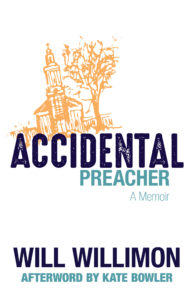 Accidental Preacher: A Memoir Will Willimon (Eerdmans) $24.99 We want to be among the first to announce this – and note that there is a lovely Afterword by Kate Bowler. I suppose Willimon is one of those writers who most everyone who reads BookNotes would have heard of. He’s written dozens of books (which have sold over a million copies) and is often cited as one of the best preachers in America. He has been a rural pastor, an urbane preacher, a scholar, writer (including a novel), a seminary professor, a chaplain (at Duke) and a United Methodist Bishop. He has co-written books with his friend Stanley Hauerwas and is considered, by some, too theologically conservative and, by others, too theologically liberal. Some say he’s cranky, others say he’s a softy. We first heard him here in Dallastown (yes, at a small UCC church, decades ago) and he spoke at our Pittsburgh Jubilee conference. He has been outspoken on the need for the church to be theologically astute, for pastors to be caring but deep, and for the church to bear witness to the ways of Christ in society, standing against injustice, racism and apathy about poverty. He’s our kind of guy.
Accidental Preacher: A Memoir Will Willimon (Eerdmans) $24.99 We want to be among the first to announce this – and note that there is a lovely Afterword by Kate Bowler. I suppose Willimon is one of those writers who most everyone who reads BookNotes would have heard of. He’s written dozens of books (which have sold over a million copies) and is often cited as one of the best preachers in America. He has been a rural pastor, an urbane preacher, a scholar, writer (including a novel), a seminary professor, a chaplain (at Duke) and a United Methodist Bishop. He has co-written books with his friend Stanley Hauerwas and is considered, by some, too theologically conservative and, by others, too theologically liberal. Some say he’s cranky, others say he’s a softy. We first heard him here in Dallastown (yes, at a small UCC church, decades ago) and he spoke at our Pittsburgh Jubilee conference. He has been outspoken on the need for the church to be theologically astute, for pastors to be caring but deep, and for the church to bear witness to the ways of Christ in society, standing against injustice, racism and apathy about poverty. He’s our kind of guy.
Accidental Preacher is in my bag as we speak — I’ve got an out of town trip to do some speaking and teaching and mentoring and bookselling in a collegiate discipleship program – and if I have any down-town, I’m diving into Will’s memoir.
Just listen to these nice endorsements:
If I believed in Bishops, I’d want one like Will Willimon — flawed, fearless, and wickedly funny. Accidental Preacher reveals a real human being who has been consistent in his commitments to Christ, the church, and the truth. Lillian Daniel
Bishop Will Willimon is a Jesus-loving, story-telling, truth-talking, laugh-generating gift from God for the church. This is a literary gem, an honest and holy revelation about vocation. Luke Powery
If Mark Twain had been a Methodist, his name would have been Will Willimon. Follow the Willimon wit to the source of Willimon’s wisdom, and I guarantee you, you won’t be disappointed. Richard Lischer
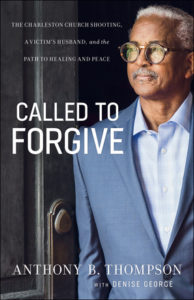 Called to Forgive: The Charleston Church Shooting, A Victim’s Husband, and the Path to Healing and Grace Anthony B. Thompson, with Denise George (Bethany House) $17.99 This past June was the fourth year anniversary of the awful day when Dylann Roof attended the Wednesday evening Bible study at the predominantly black Mother Emanuel AME Church in Charleston, South Carolina. Roof killed nine African-Americans as they prayed and one was Myra Thompson, the wife of Reverend Anthony Thompson.
Called to Forgive: The Charleston Church Shooting, A Victim’s Husband, and the Path to Healing and Grace Anthony B. Thompson, with Denise George (Bethany House) $17.99 This past June was the fourth year anniversary of the awful day when Dylann Roof attended the Wednesday evening Bible study at the predominantly black Mother Emanuel AME Church in Charleston, South Carolina. Roof killed nine African-Americans as they prayed and one was Myra Thompson, the wife of Reverend Anthony Thompson.
I needn’t say much about this holy, sacred story. It is about tragedy and pain, about the devastating impact of this on the faith community and, yes, obviously, on Rev. Thompson. Yet, as you can tell from the title, Thompson chose to forgive — both privately and publicly. And that wasn’t easy and it wasn’t necessarily considered appropriate. As the book makes clear, some in the church and broader community still don’t understand why Thompson — of Trinity Reformed Episcopal Church of Charleston — spoke out about forgiveness for the obviously demented, racist murderer. He had a piece in the Washington Post and other national media picked up the movement in the stricken city for unity and reconciliation. Called to Forgive is, in a way, a study of forgiveness, but at first it is an account of the Charleston Church shooting as viewed by the husband of a woman who was there, killed in the massacre. It is a study of the community, the story of a movement for healing, and the hardships and noble faith of this one man, deeply connected to Emanuel AME.
There is a long appendix that includes the letter Thompson sent to Roof (at his incarcerated address in Terre Haute. There is also a copy of the resolution “A Call to Prayer from the Bishops of South Carolina” and a “Resolution to Recognize, Denounce, and Apologize for the City’s Involvement with Slavery”
Unlike many literary memoirs, Called to Forgive does have a preacher’s agenda. The Reverend wants us to learn to forgive. There is a good Bible study in the back, making it useful for anyone wanting the Biblical basis for acts of selfless reconciliation, which includes discussion questions for book clubs reading the story who want to process it together along with some Scriptural content as well. It makes for a very nice package, and we’re earnest in our desire to commend it to you.
For what it is worth, although not a memoir, we recommend the major report on the Charleston story called Grace Will Lead Us Home: The Charleston Church Massacre and the Hard, Inspiring Journey to Forgiveness by expert journalist and religion writer (and Pulitzer Prize winner) author Jennifer Berry Hawes (St. Martin’s Press; $28.99.) For Such a Time as This: Hope and Forgiveness After the Charleston Massacre by Sharon Risher (Chalice Press; $18.99) is more like a memoir — Risher lost her mother and two cousins in the attack by Dylann Roof. Her own story looks riveting and is said to be very good. We have it, of course, but I haven’t read it yet. As the publisher explains: “Sharon’s story is a story of transformation: How an anonymous hospital chaplain was thrust into the national spotlight, joining survivors of other gun-related horrors as reluctant speakers for a heartbroken social-justice movement. As she recounts her grief and the struggle to forgive the killer, Risher learns to trust God’s timing and lean on God’s loving presence to guide her steps. Where her faith journey leads her is surprising and inspiring, as she finds a renewed purpose to her life in the company of other survivors.”
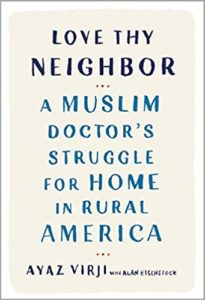 Love Thy Neighbor: A Muslim Doctor’s Struggle for Home in Rural America Ayaz Virji (Convergent) $26.00 This is pretty much just what you’d expect, but I was very, very moved, nicely entertained, a bit troubled, and very glad I picked this up. It had me hooked by the fist dramatic page. It had gotten a coveted starred review from Publisher’s Weekly and is (I think) the first book by an Islamic author published by this progressive, Christian publishing house. Love Thy Neighbor: A Muslim Doctor’s Struggle for Home is a great read — lovely, hard, important.
Love Thy Neighbor: A Muslim Doctor’s Struggle for Home in Rural America Ayaz Virji (Convergent) $26.00 This is pretty much just what you’d expect, but I was very, very moved, nicely entertained, a bit troubled, and very glad I picked this up. It had me hooked by the fist dramatic page. It had gotten a coveted starred review from Publisher’s Weekly and is (I think) the first book by an Islamic author published by this progressive, Christian publishing house. Love Thy Neighbor: A Muslim Doctor’s Struggle for Home is a great read — lovely, hard, important.
The story begins in a tense meeting where the good Doctor Virji is presenting about his life and faith to a very mixed crowd – friends and enemies, it seems, supporters and protesters – in a small town in Minnesota. He left his high-pressure practice in a big hospital in Pennsylvania to take up a slower pace of caring, humane medicine (his story about that is almost worth the price of the book) in a town of not even 1500 folk. Things were going well, or so he and his wife thought, but somehow, at some point in 2016 (during the campaign of Donald Trump) anti-Muslim rhetoric started sprouting up, hate speech and ugliness emerged, and (as the only Muslim in the area) was asked – by his friend, a Lutheran pastor – to just tell about his life and faith for those who wanted to understand a bit about Islam. That his wife wore hijab in this rather rural, upper mid-Western town was not controversial until it was. His kids were safe in the schools, until they started facing hostile remarks. Some of his patients who once were loyal and appreciative started to question whether he and his family belonged there.
Mandy France, the seminary intern at Grace ELCA church, rather bravely asked him to do a talk for the community at large which they called “Love Thy Neighbor.” Even though the church asked Dr. Virji to present (in the public school auditorium) and she explained her Christian credentials as the host, rumors flew that this was going to be a time of propaganda and mind control in order to recruit Islamic terrorists. Fearful, some protested. The nasty stuff got ugly.
So begins the story of this caring doc in his small town where he and his wife – who owned a skin care salon on the square – thought they were well loved. Love Thy Neighbor is a very timely book.
Dr. Ayaz Virji is a family physician practicing still in small town Dawson Minnesota. He received his BA in history from Georgetown University and his MD from the School of Medicine there. He did his residency at Duke University Medical Center. He has published peer-review scholarly medical journal articles but also, in his free time, continues to present his “Love Thy Neighbor” lectures in schools, libraries, community centers, faith communities and colleges. In fact, some of this story continues as he faces both good and bad experiences on the road, telling his story and building inter-faith coalitions of good will throughout the country. This is a really interesting book, and I’m sure you’ll be glad you read it, knowing a bit about Islamic faith, but more, about what it is like to be a Muslim in middle America in these hard times. Want to protest our President’s careless tweets about “sending back” people who protest his insidious racism? Buy this book and share this other perspective!
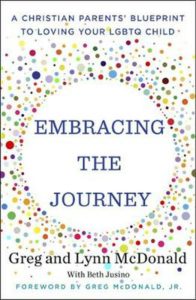 Embracing the Journey: A Christian Parent’s Blueprint to Loving Your LGBTQ Child Greg and Lynn McDonald (Howard Books) $26.00 Not everyone will agree with this journey – reluctant at times – towards acceptance and inclusion that these evangelical parents promote, but I do not list it firstly as a self-help guide for religious parents and their LGBTQ+ adult kids. I list it here as a memoir, a story, a captivating, engaging narrative of a family coping with their own unique situation and the conflict and renewed deepening of discipleship and faith in evoked.
Embracing the Journey: A Christian Parent’s Blueprint to Loving Your LGBTQ Child Greg and Lynn McDonald (Howard Books) $26.00 Not everyone will agree with this journey – reluctant at times – towards acceptance and inclusion that these evangelical parents promote, but I do not list it firstly as a self-help guide for religious parents and their LGBTQ+ adult kids. I list it here as a memoir, a story, a captivating, engaging narrative of a family coping with their own unique situation and the conflict and renewed deepening of discipleship and faith in evoked.
The title says it all, but you should know that this book offers an honest glimpse into the journey of decent (if at times conflicted or confused) Christian parents and their experience of their beloved son coming out near the end of his senior year of high school. Unlike some of the truly awful stories – think of the powerful read, Boy Erased, or Refocusing My Family: Coming Out, Being Cast Out, say – these parents loved their son well, wanted to support him in ways that seemed right and good, and struggled as many do who are in rather ordinary evangelical churches. They have their disappointments and perplexities, and this book shares some of that in page-turning story, Greg’s view and Lynn’s view, shared back and forth. It makes for a good read.
This is not a harrowing, gut-wrenching story of shifting away from the vile hatred that some fundamentalists pour out on their own gay children, but it isn’t a story of just “hey, whatever…” either. I suspect that it is a fairly common sort of story, good Christian folks just wanting to figure out what to do and how to respond to the (not so surprising, it turns out) revelation of their son, Greg. Greg McDonald, Jr. in fact, has a wonderful foreword that made my heart glad. You see, we know some young adults who are sexual minorities, as we sometimes say, gay or lesbian or trans, whose religious families have abandoned them, hurt them, betrayed them, and it is a God-given grace that this family did not go through that sort of spiteful hostility. They had their moments, their tears, their mis-steps, and Embracing the Journey is candid, if not raw.
In a way, the wisely gracious, fairly non-sensational insight learned – sometimes slowly, sometimes painfully – within the McDonald family makes this a more moving book than a gross story of abuse and tragedy. The nearly mundane ways the mother (Lynn) and the father (Greg) experienced moments from their son’s high-school and college years, his dating, his faith experiences as he followed Jesus as an out gay young man, and their own “coping” and learning to be candid about it all, is itself page turning.
As evangelical writer and leader John Ortberg (senior pastor of Menlo Park Presbyterian) says of Embracing the Journey, it is:
“Filled with extraordinary levels of love and pain and humility and learning and grace and hope.”
Pastor Bill Willits of North Point Ministries says that this book is “a compelling description of a challenge faced by more and more people in the modern church: how to love God and their gay child without losing their faith or their relationship with either…”
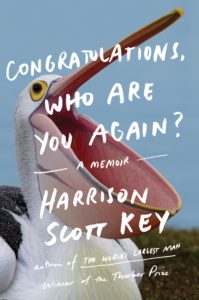 Congratulations, Who Are You Again? A Memoir Harrison Scott Key (Harper Perennial) $15.99 For some of us, taking books on a vacation or sitting under a canopy in the back deck, is a special pleasure this time of year and I wanted to suggest at least one book that was wise and truly funny, engrossing and sure to make you chuckle out loud. A buddy of mine and mail order customer of ours mentioned to me that he is in a little band in his church – a bunch of older guys who get together to rock out about old guy stuff, which itself is kinda of funny – and that memoirist Harrison Scott Key was in this little side hustle of his. Holy smokes, I couldn’t believe it. Key wrote the best-selling and evidently hilarious memoir-ish collection of essays called The World’s Largest Man and thereby won the prestigious Thurber Prize. As in James Thurber. As in fine, literary comedic prose.
Congratulations, Who Are You Again? A Memoir Harrison Scott Key (Harper Perennial) $15.99 For some of us, taking books on a vacation or sitting under a canopy in the back deck, is a special pleasure this time of year and I wanted to suggest at least one book that was wise and truly funny, engrossing and sure to make you chuckle out loud. A buddy of mine and mail order customer of ours mentioned to me that he is in a little band in his church – a bunch of older guys who get together to rock out about old guy stuff, which itself is kinda of funny – and that memoirist Harrison Scott Key was in this little side hustle of his. Holy smokes, I couldn’t believe it. Key wrote the best-selling and evidently hilarious memoir-ish collection of essays called The World’s Largest Man and thereby won the prestigious Thurber Prize. As in James Thurber. As in fine, literary comedic prose.
So I was delighted to have this little connection and glad to know this best-selling Thurber Prize winning writer was a follower of Jesus and active in a church. Or least in a church-based an oldster rock and roll cover band. This is just great, I figured.
And, whew, was I right – this Southern Man is funny and wise and a really witty writer. His story is “inspiring and riotously funny” as the back cover puts it. It is, actually, very much in keeping with our own visions of vocation and hopes that our bookstore can help people make a difference in the world as they take up their own sense of calling.
Mark Twain (speaking of wise-cracking and often wise and funny American writers) is said to have said that the two most important days in your life are the day you were born and the day you find out why. That preaches and I’ve said it often, although sometimes I forget who said it and just make something up. (Maybe James Thurber?)
Mr. Key reports this well-known adage, noting that this is really is talking about dreams, about one’s destiny and such, but observes, “What Mr. Twain doesn’t say is a dream is also a monster that wants to eat you.” (“Nobody tells you this part of the American Dream,” he writes. “Until now.” Ha!)
Harrison grew up in Mississippi, we learn, and “possessed many special gifts, such as the ability to read and complete college applications.”
From the back cover:
Yet, throughout young adulthood, he failed at many vocations until one day – after drinking perhaps too many beers and dusting off his King James Bible – he stumbled across a passage about a lonely pelican, which burst into flame inside him. In a mad blaze of holy illumination, Harrison realized his dream: to set the world on fire with a funny book. All he had to do was write one.
So, maybe we could call this an instructive tale of pursuing one’s destiny with relentless (of sometimes misguided) devotion. And it does get serious as he grapples with priorities and family and art and sanity. But I mostly just want to call it a great read, a fine memoir, a story to enjoy no matter what season of life you are in.
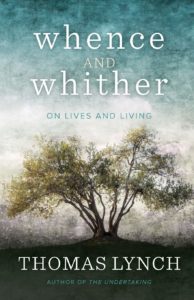 Whence and Whither: On Live and Living Thomas Lynch (WJK) $18.00 With a nice textured cover with French folds and deckled edges, this handsome paperback book bears a certain sort of weight, insinuating that it is serious, mature, heavy, even. And it is. The writer is the nearly legendary author of the late 1990’s book about the funeral business called The Undertaking: Life Notes from the Dismal Trade and it’s wonderful, must-read sequel, Bodies at Motion and at Rest: On Metaphor and Morality. These are among my all-time favorite books, by the way, and we have subsequently carried and promoted Lynch’s poetry, his memoir about going back to Ireland, Booking Passage, and, of course, his co-authored books with theologian and preacher Thomas Long on a theology of and righteous practice of funerals (The Good Funeral.) Lynch is a literate figure, intellectual and writerly, and his prose is stunning; it moves from humorous storytelling to philosophical observations, from artful lines and illuminating insight. And he wrote me a letter, once, so there’s that. I love this guy.
Whence and Whither: On Live and Living Thomas Lynch (WJK) $18.00 With a nice textured cover with French folds and deckled edges, this handsome paperback book bears a certain sort of weight, insinuating that it is serious, mature, heavy, even. And it is. The writer is the nearly legendary author of the late 1990’s book about the funeral business called The Undertaking: Life Notes from the Dismal Trade and it’s wonderful, must-read sequel, Bodies at Motion and at Rest: On Metaphor and Morality. These are among my all-time favorite books, by the way, and we have subsequently carried and promoted Lynch’s poetry, his memoir about going back to Ireland, Booking Passage, and, of course, his co-authored books with theologian and preacher Thomas Long on a theology of and righteous practice of funerals (The Good Funeral.) Lynch is a literate figure, intellectual and writerly, and his prose is stunning; it moves from humorous storytelling to philosophical observations, from artful lines and illuminating insight. And he wrote me a letter, once, so there’s that. I love this guy.
I mentioned this book when it came out this Spring, but want to share a bit more about it again, here, now. It is to be savored so is ideal for the slower pace of summer reading.
Lynch is a reader’s writer, just a great, learned, well-read and literate character, Irish, Catholic, a sober, recovering alcoholic. Younger writers about “the dismal trade” (like the lively, central Pennsylvanian Caleb Wilde, who recently wrote Confessions of a Funeral Director: How Death Saved My Life or the punk rock energetic, fabulously quirky, cussing Caitlin Doughty who wrote Smoke Gets in Your Eyes And Other Lessons from the Crematory) all adore him for his dignified telling about the vocation of helping the dead get where they need to get, and the living do what they need to do during the time of death and repose. Lynch is so good that not long ago I read an excerpt of this new one at a funeral of a dear, dear friend (who himself loved Lynch’s books and workshops for pastors.)
This great Whence and Wither book is not exactly a memoir, like The Undertaking or Booking Passage, but his writing is so engaging, his storytelling so vivid, his cultural studies and faith-infused ruminations so interesting (and rooted in his own life and times) that this feels very much like a memoir. Spiritual writer Heidi Haverkamp calls it “a wistful but vivid collage of memoir” (even though it includes some poems and even a short play.) “Here more than ever,” she continues, “Lynch writes with the very soul and guts of himself and invites us to peek alongside him through the veil and into the eternal.”
As theologian Tom Long says about Lynch:
Tom has the discerning eye of a poet and essayist, the wisdom and gravitas of a funeral director, and most of all, the empathetic imagination to be a shrewd observer of people, living and dead, with whom he has shared this planet. And he tells these stories – his story – the beginnings, the middles, and the anticipated endings, with the elegance of one who is a master of language and with the whimsy of one who relishes his Irish roots. This is a book to enjoy, to learn from, and to savor.
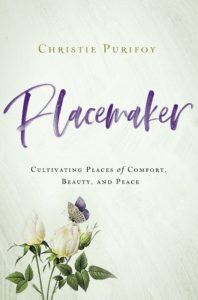 Placemaker: Cultivating Places of Comfort, Beauty, and Peace Christie Purifoy (Zondervan) $18.99 It is one of the great joys of recent months to have gotten the chance to finally meet Pennsylvania author Christie Purifoy, a memoirist and essayist of the finest quality, who can turn a phrase like nobody’s business. A few years ago she wrote a lovely book about her spacious, old farmhouse “in four seasons” (Roots & Sky: A Journey Home in Four Seasons) and it was quite good. But his Placemaker book is extraordinary, delightful, compelling, enjoyable on many levels. The other evening at a book event she read movingly from a section about fermentation (you know, sauerkraut, kombucha, making pickles, even.) The Earth’s processes of death and decay, entropy, chaos and the like became a window for reflecting on our desires for control, for reigning in the chaos. She frets about these things as we do, but she also tends orchards and writes glowingly about trees. Creation and Fall and Redemption swirl together in her gorgeous reflective prose and a book about place becomes a vision for living into God’s healing ways, on Earth as it is in Heaven.
Placemaker: Cultivating Places of Comfort, Beauty, and Peace Christie Purifoy (Zondervan) $18.99 It is one of the great joys of recent months to have gotten the chance to finally meet Pennsylvania author Christie Purifoy, a memoirist and essayist of the finest quality, who can turn a phrase like nobody’s business. A few years ago she wrote a lovely book about her spacious, old farmhouse “in four seasons” (Roots & Sky: A Journey Home in Four Seasons) and it was quite good. But his Placemaker book is extraordinary, delightful, compelling, enjoyable on many levels. The other evening at a book event she read movingly from a section about fermentation (you know, sauerkraut, kombucha, making pickles, even.) The Earth’s processes of death and decay, entropy, chaos and the like became a window for reflecting on our desires for control, for reigning in the chaos. She frets about these things as we do, but she also tends orchards and writes glowingly about trees. Creation and Fall and Redemption swirl together in her gorgeous reflective prose and a book about place becomes a vision for living into God’s healing ways, on Earth as it is in Heaven.
Beth and I can’t say enough about our new friend Christie and her husband; we are eager to encourage you to buy this very handsomely made book — again, deckled pages, French folded covers, texture paperback with some tactile beauty — and to enjoy her reflections on home and gardening and beauty and life. Even amidst the ruins. What a book! The author has dirt under her fingernails, by the way. Oh, and a PhD in literature from the University of Chicago.
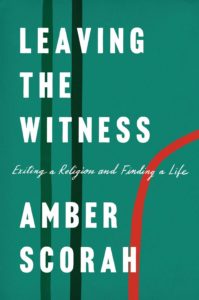 Leaving the Witness: Exiting Religion and Finding a Life Amber Scorah (Viking) $26.00 I don’t usually feel a need to warn folks about a book, although this (and the next I’ll describe) carry a bit of a concern. Bear with me while I describe this too quickly. I couldn’t put it down, staying up to the wee hours, and yet was so very deeply saddened by how this story ends, as the subtitle implies, in atheism. This calm willingness to face an essentially meaningless life devoid of faith or the transcendent is unsettling, and I trust that it will not unduly influence readers in that (tragic) direction. I worry about such things.
Leaving the Witness: Exiting Religion and Finding a Life Amber Scorah (Viking) $26.00 I don’t usually feel a need to warn folks about a book, although this (and the next I’ll describe) carry a bit of a concern. Bear with me while I describe this too quickly. I couldn’t put it down, staying up to the wee hours, and yet was so very deeply saddened by how this story ends, as the subtitle implies, in atheism. This calm willingness to face an essentially meaningless life devoid of faith or the transcendent is unsettling, and I trust that it will not unduly influence readers in that (tragic) direction. I worry about such things.
Still, this book was so very interesting and valuable in many ways. Here’s the short version: Amber was raised in the super-strict confines of the Jehovah Witness cult and her telling of her growing up with their rules (and shame when she transgressed – by making out with a boy, say) is riveting. The danger of cults was well-known a generation ago, but there are fewer books these days in our pluralizing culture that tends towards a “whatever” sort of tolerance. Of course we should always be gracious to any of our neighbors and friends, regardless of how toxic their religion, but I found this a vivid reminder of how religion can be weird, life-denying, scary, even. So this is an insider’s look at life in the JW faith, what many call a cult.
The telling of her youth in the Witness family is captivating, but the heart of the book, though, is when Amber and her new husband – who she realized too late was not in love with her, nor her with him – became Witness missionaries in China. Her story is page-turning. (Having friends who themselves lived in China and knowing some who served as missionaries in that vast, extraordinary land, made her descriptions that much more captivating.) This sharply written memoir carries us towards this odd missionary calling and her own stepping into a work for which she was not trained. (Unfathomable, I thought.) What does one do there? How does one meet people? How does one develop friendships with the hope of reaching out with faith and hope? How does one share the gospel?
Back when I did campus ministry, I felt very much like this – hanging around the student union and dorm, hoping that God would lead me to open seekers who might want to talk about meaning and purpose, grace and goodness, salvation and eternity. How does one act normal and yet strike up authentic conversations with new friends about the truth of the gospel? That was this author’s struggle, and it was so interesting learning of her contact work, her building trust with new friends, her desire to share what she thought was good truth for hell-bound Chinese folks. (All of this subtle outreach being attempted with language and cultural barriers, and the constant fear that if one talked about God or religion with members of the Communist Party she or her husband could be deported, or worse.)
I will not spoil how it all happened but Leaving the Witness is a sad but very human story of loss of faith, of friendships gained and lost, of sexual desire, longing for healthy relationships, the process of discerning a career, discovering human curiosity, trust, cross-cultural friendship, politics, the fraying of family relations, intellectual growth, grief, and more.
As Katherine Zopf (of Excellent Daughters) writes:
Amber Scorah has written an unforgettable book. With warmth, curiosity, and humor, Scorah examines how the experience of living in a society that operates according to different rules, informed by different values, can ultimately change the way we see ourselves.
One reviewer says Leaving… is “part Graham Green expat intrigue, part Orwellian groupthink expose” and “a vivid and unflinching account of what it means to live on the fringes of society.”
I am not glib about her story, her unfaithfulness to her religion, her marriage, her family. She is not either. But yet, to break out of a cult is finally very good news, I believe, even if it means one loses everyone and everything. One reviewer says Leaving the Witness is “for the fearful and the brave.” Exactly.
Alas, I must say: I wish in the part of the book in which she tells of her conversations with those who help her deconstruct her JW faith, there would have been on the table an evaluation or consideration of the claims of classic, historic, Christian faith. I have asked others who have left super-strict, toxic, fundamentalism why they became skeptics or atheists rather than moderate, rather ordinary Protestants. Why not try the Mennonites or Episcopalians? There are such robust, rich, and healthy sorts of thoughtful faith – from St. Francis to C.S. Lewis, from Martin Luther King to Rowan Williams, from Dorothy Sayers to Dorothy Day, from Lee Stroebel to Anne Lamott, from Marilyn Robinson to John Stott – whose vision of a meaningful, lively faith that believes the gospel to be true truth. To reject theism, generally, and Jesus, particularly, because of toxic and cult-like fundamentalists, without considering the historic church and the healthy goodness of classic Christianity (not to mention the question of the historicity of the gospel account of Jesus) seems to me to be intellectually dishonest. I get that the great pain and the great freedom experienced by the likes of Amber Scorah may not allow for consideration of the plausibility of serious religion, at least not at first. Read this book, take in her tale, and pray for insight as to how to respond well to this sort of story. Hers is more curious than most, wrought as it is, but it is not uncommon.
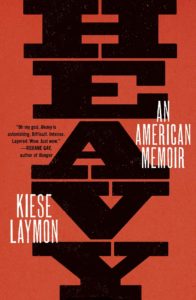 Heavy: An American Memoir Kiese Laymon (Scribner) $26.00 hardback; $16.00 paperback Oh my, this is another that I couldn’t put down, that moved me considerably, that I want to commend, but feel like I have to offer some honest notes so you can determine if this book is for you or not. I picked it up for a variety of reasons; like many Hearts & Minds friends and customers, I am a white guy wanting to be more deeply aware of the stories of people of color; as the subtitle suggests, it is a deeply American story and I do not want to look away. I am also interested in questions of the body, how weight is seen and experienced – I mentioned feminist hero and great, great writer Roxanne Gay, above, and it was her lively endorsement of Heavy that really caught my attention. If she says the topic and the prose is that breathtaking, I knew I wanted to read it.
Heavy: An American Memoir Kiese Laymon (Scribner) $26.00 hardback; $16.00 paperback Oh my, this is another that I couldn’t put down, that moved me considerably, that I want to commend, but feel like I have to offer some honest notes so you can determine if this book is for you or not. I picked it up for a variety of reasons; like many Hearts & Minds friends and customers, I am a white guy wanting to be more deeply aware of the stories of people of color; as the subtitle suggests, it is a deeply American story and I do not want to look away. I am also interested in questions of the body, how weight is seen and experienced – I mentioned feminist hero and great, great writer Roxanne Gay, above, and it was her lively endorsement of Heavy that really caught my attention. If she says the topic and the prose is that breathtaking, I knew I wanted to read it.
Reviewers and critics raved about the writing as it garnered accolade after accolade late last year. It has been called “dazzling”, “bone-deep crackling”, “cathartic”, “unflinching”, “gutting”, “searing”, “staggering”, and “artfully crafted.”
Kiese tells of his own growing up poor and obese and black in Jackson Mississippi in a home with a mother who curiously abused him violently and who was, herself, working as an academic in African American and gender studies. I do not know if I know anyone raised in such a high-octane, intellectual environment that was so full of Black Panther fury against whites and the systemic injustices of America and who was poor and working in higher education. Kie’s extended family were not highly educated but all were deeply, deeply wounded by racism and deeply, deeply suspicious of white people. And some pretty crafty and street smart. What characters!
I must warn you that this book includes scenes of physical punishment that are harsh and disturbing. There is some sexual violence and graphic descriptions of Laymon’s own sexual awakenings. There is lots of vulgar language, course talk, candid observations. If that offends you, this book is not for you.
Further, much of the writing is exceptionally creative, modern (postmodern?) in flow and style. Heavy is often (but not always) written in a notable black vernacular, what the scholars used to call Ebonics. As one who studied this years ago, and who lived in an inner city setting for a while, this was actually almost playful to read at times, although I swear I didn’t know what he was talking about on some pages. In his youth and college years Kiese and his friends had funny nicknames for almost everyone and they are as witty and fast-paced as any rapper laying it down. Mississippi slang from this contemporary era is a lot different than the urban jive I became familiar with decades ago and so one can enjoy this for the sheer abundance of the language.
I was half-finished with this moving portrait of a big black boy becoming a trim but still large black man, teaching up North at Vassar for a while, when the New York Times Book Review published their list of the top 50 memoirs of the last 50 years. What a list. I do not think there was any memoir from this past year listed except Heavy. In that review they said:
Heavy is a gorgeous, gutting book that’s fueled by candor yet freighted with ambivalence. It’s full of devotion and betrayal, euphoria and anguish, tender embraces and rough abuse…the liberation on offer doesn’t feel light and unburdened; it feels heavy like the title, and heavy like the truth…Salvation would feel too weightless—as if [Laymon] could forget who he is and where he has been. This generous, searching book explores all the forces that can stop even the most buoyant hopes from ever leaving the ground.
BookNotes

SPECIAL
DISCOUNT
20% OFF
ANY BOOK MENTIONED
[[except the one noted as mentioned above]]
+++
order here
this takes you to the secure Hearts & Minds order form page
just tell us what you want
inquire here
if you have questions or need more information
just ask us what you want to know
Hearts & Minds 234 East Main Street Dallastown PA 17313
read@heartsandmindsbooks.com
717-246-3333
